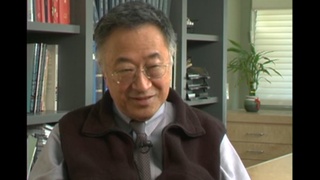Interviews
Getting citizenship back
Well, If you married an alien, you lost your citizenship, because all aliens -- especially the Japanese, the Isseis -- they were not allowed to become citizens, therefore they couldn't allow, they couldn't own anything, either. So all the farmers had their children's name on farms or whatever they had, why, they had to put it in their children's name. And we had quite a bit of trouble, because after my sister passed away, then it was put in my brother's name.
He [my husband] was born in Japan, and came to this country as a youngster. So I had to go and apply, I wanted to get my citizenship back, so immediately I went to class; 'course, you had to learn a little bit of history about the United States, then I had to go to court and answer some questions, and I was real happy when I got my citizenship back, and they gave me a little American flag. Of course, we got ribbed a lot about our citizenship when we went to camp, though. But I was real happy to get my citizenship back.
Date: September 15-17, 2004
Location: Washington, US
Interviewer: Alice Ito
Contributed by: Denshō: The Japanese American Legacy Project.









